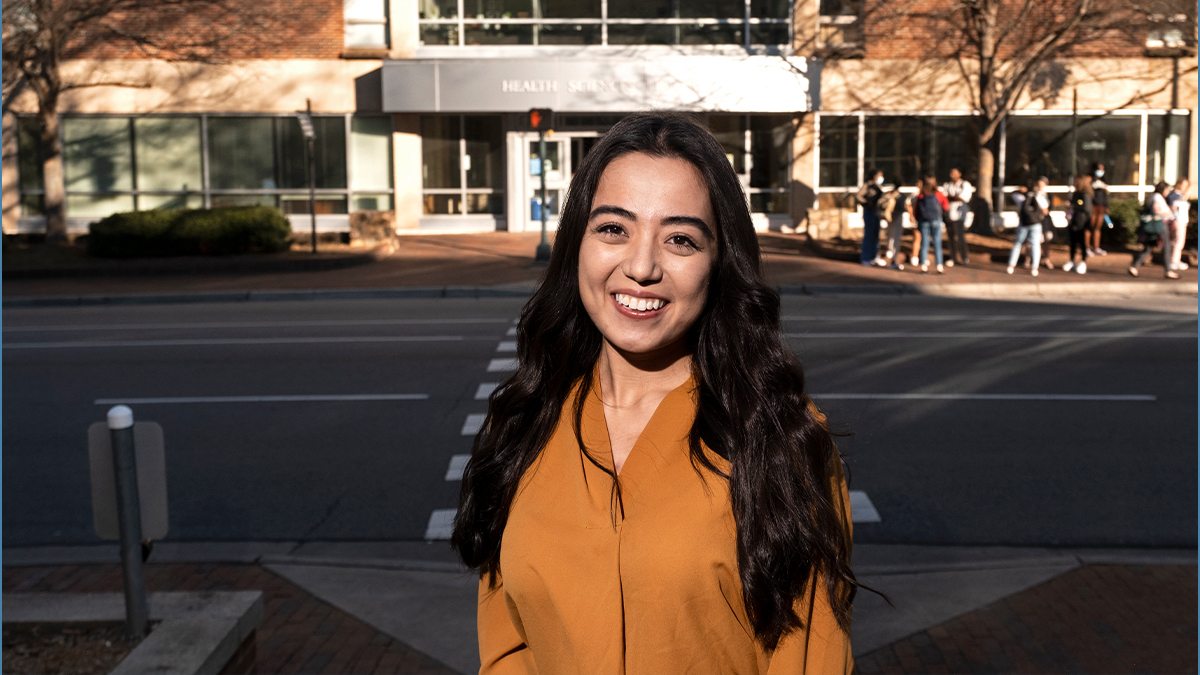Helping patients find their voice
Fourth-year medical student Nakisa Sadeghi uses her fluency in multiple languages to advocate and translate for underserved communities. She looks forward to pursuing her passion for health equity as a dermatologist and public health advocate.

Nakisa Sadeghi came to Carolina with no intention of becoming a doctor but discovering how her passion for languages could intersect with medicine changed her mind. Now, Sadeghi is near the final stage of medical school, and on March 17, Match Day, she will learn where she will do her residency.
Sadeghi, originally from northern Virginia, came to Carolina as a Morehead-Cain Scholar and majored in French, adding another language to her skill set, having already been fluent in Spanish and Japanese. She learned about pre-med courses through friends and was intrigued, but she didn’t want to give up her focus on the humanities.
“No one in my family is in medicine, so it was never on my radar,” Sadeghi says. “My interest in the humanities felt like a given because more than anything, I’d always loved learning about people, their stories, and their cultures. But I also wanted to keep an open mind about a future career.”
As an undergraduate, Sadeghi ‘17 volunteered with the Carolina Language Partnership, an on-campus organization that provides one-on-one English language classes to Carolina staff members who don’t speak English as their first language. She spent some afternoons performing the piano in local nursing homes and in waiting rooms at UNC Hospitals and other afternoons leading Carolina’s Persian Cultural Society. These opportunities strengthened her resolve to go into a field where she could serve people from all walks of life.
“I realized that, in many ways, medicine is an art and it represents the height of the humanities,” she said.
Sadeghi majored in French and minored in business administration and chemistry and then decided to pursue a medical career. She was accepted into Carolina’s School of Medicine, where she leveraged her language skills with the Comprehensive Advanced Medical Program of Spanish. Sadeghi had already worked for a couple of years as a nationally certified medical interpreter in Spanish. The CAMPOS program gave her an additional opportunity to strengthen her medical Spanish skills and advocate for non-English-speaking patients and caregivers in the hospital.
“I’ve always known I wanted to help patients with language needs,” Sadeghi says. “Growing up around multiple cultures, I saw how language can unify and facilitate connections between people, but it can also pose barriers. Interpreting allows me to advocate and quite literally be a voice for those who struggle to navigate the healthcare system.”
Language isn’t the only barrier to health care Sadeghi wants to tackle after she graduates from medical school. Her clinical rotations exposed her to the many other social issues that impact health far beyond the clinic or hospital. She took two leaves of absence in medical school to pursue public health, where she worked to tackle those barriers in full force. After her third year of medical school, Sadeghi spent a year working as the special assistant to the president of Planned Parenthood and later serving as a visiting scholar at the George Washington University School of Public Health. She took an additional year to earn a master’s degree in public health with a focus on health policy from Harvard University.
Her goal is to use her clinical and public health experiences in her future specialty of dermatology to serve vulnerable populations.
“I am committed to pursuing a career at the intersection of medicine and public health after graduation,” Sadeghi says. “It’s important to me to provide clinical care to underserved communities and to leverage health policy to improve access to health care for those who need it most.”
On Match Day this week, Sadeghi hopes to match in the field of dermatology to achieve those goals. She says medical dermatology appeals to her because it deals with the overlap of skin ailments and other systemic health issues, from rheumatology to infectious disease.
“There is a lot that I love about dermatology, but what really stands out to me is the vast unmet need in the field. Many cannot afford or access dermatologic care, and they suffer poor health outcomes as a result. As I’ve seen in my clinical and public health experiences, low-income and minority communities consistently bear the brunt of those health disparities.”
No matter where or what program she matches with, Sadeghi plans to continue her work of advocating for patients and creating a more equitable healthcare system.
On March 17, Sadeghi matched into medicine-dermatology residency at Massachusetts General Hospital and Brigham and Women’s Hospital.




